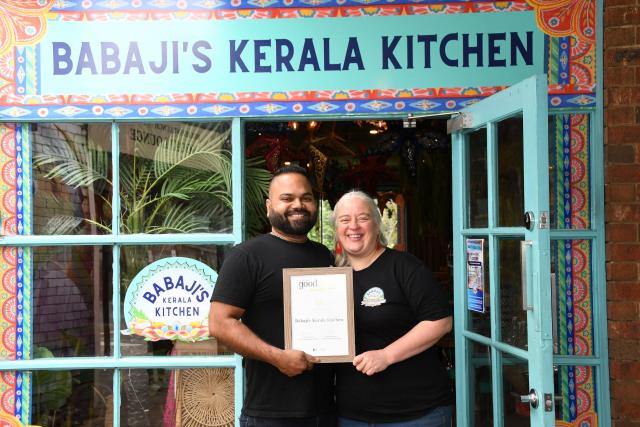
By Callum Ludwig
Local hospitality businesses in the Outer East have met with Casey MP Aaron Violi to express concerns about the impact that ongoing changes in Australia’s Migration Strategy could have on skills shortages in the industry.
Babaji’s Kerala Kitchen in Warburton and Belgrave could be one such business affected by potential changes to visas, with the restaurants built around the authentic skills of South Indian chefs sponsored by the business to work in their restaurants.
Co-owner Billy Crombie said being a specialist restaurant does make it a little bit more challenging but she couldn’t operate without these chefs.
“We employ 47 staff between those two restaurants, and there are seven chefs, and for us, our chefs are very specialist in their cooking skills so we sponsor those chefs, and without the ability to do that, we would not be open,” she said.
“We’d have to close Warburton and probably even Belgrave, obviously I’d love to employ locals, and we do employ a lot of locals, but if we put the adverts in the paper to seek young chefs, we don’t get a single applicant.”
Ms Crombie co-owns the business with her husband Max Kamil Hassan who hails from Kerala, starting out as a food truck selling dosa which has expanded to its two current venues and gone on to be one of only two Indian restaurants in Victoria to be hatted by food critics from The Age.
Ms Crombie said losing the ability to sponsor chefs could have massive knock-on effects for other local staff.
“That’s potentially 38 jobs [not including herself and Mr Hassan who is a head chef] that are not here for a start, and then obviously you’ve got the impact on the suppliers that you’re supporting whether that be for your vegetables, your meat or your wine,” she said.
“That’s even though we are a little bit different to some other hospitality businesses as we’re still totally open to training locals to cook our food,”
“I’m extremely anxious about it at the moment, and I know we’re only in the consultation stage and waiting to hear what they say, but I actually can’t imagine them doing this because so many of us have to rely on sponsored chefs and I just don’t understand how they think we’d be supposed to operate.”
Any mooted changes are being considered as part of the Australian Government’s Migration Strategy following the 2023 Review of the Migration System.
Chefs (not including positions in factory settings or limited service roles such as at fast food restaurants or cafes) had previously been eligible for the Temporary Work (Skilled) visa (subclass 457) before it was abolished in 2017 and evolved into the current Temporary Skill Shortage (TSS) visa (subclass 482) which now will be abolished and replaced by the Skills in Demand visa in late 2024.
The four-year Skills in Demand visa is split into three pathways defined by skill level; Specialist (highly skilled, earning over $135,000 per annum in key fields like technology and energy), Core (high demand, $70,000 to $135,000 per annum, updated and changed over time) and Essential (address labour shortages, pathway for lower incomes to residency, below $70,000 per annum).
The $70,000 threshold comes from the new Temporary Skilled Migration Income Threshold (TSMIT) implemented in July 2023 which had not previously been updated from $53,900 and taking it to where it would have been if it was indexed over the decade. It will now be indexed annually to prevent similar circumstances, with the Migration Strategy stating that by 2023, around 90 per cent of all full-time jobs in Australia paid more than the TSMIT, a fact which ‘undermined the basis of Australia’s skilled migration system and helped erode public confidence in it.’
Mr Violi said hospitality is a big part of the community and the reality is it’s not possible for businesses to access the labour that they need, chefs and cooks in particular, in short demand.
“For a business like Billy’s, it’s a bit more unique, given the nature of the Southern Indian traditional cooking, she needs to bring chefs in but for all hospitality venues in the electorate, it’s really challenging to get local workers, so they need to have the ability to bring workers in,” he said.
“I’m concerned that the review might carve out chefs and cooks, and I’ve made representations to the Shadow Minister for Immigration Dan Tehan and we’ll be working together to make sure we understand what’s going to happen.”
The most recent Australian and New Zealand Standard Classification of Occupations (ANZSCO) data gathered by the Bureau of Statistics indicates that the ‘Chef’ profession has been in shortage nationally in each of the last three years while future demand was estimated to be above the economy-wide average in 2021 before reducing to the at economy-average in 2022 and 2023.
Chef also featured as one of the top 20 largest employing occupations in shortage in Australia in the Jobs and Skills Australia’s 2023 Skills Priority List – Key Finding Report.
Mr Violi said it’s important to remember visas can help create jobs for everyone.
“It’s not a trade-off, it’s not taking an overseas worker taking the place of an Australian worker, they complement and allow more jobs in the area,” he said.
“We’re blessed in Australia and in Casey to have a wonderful multicultural community and food is a large part of that, so to have this variety of venues from a cultural experience perspective is wonderful and I do hope and do think that it does play a little bit of a role in social harmony as well,”
“If you go and eat Indian food and speak to the team and understand a bit more about the culture, human nature says you’re going to be a little bit more understanding and it takes away some of that mystery, so there’s an important social cohesion aspect as well.”






